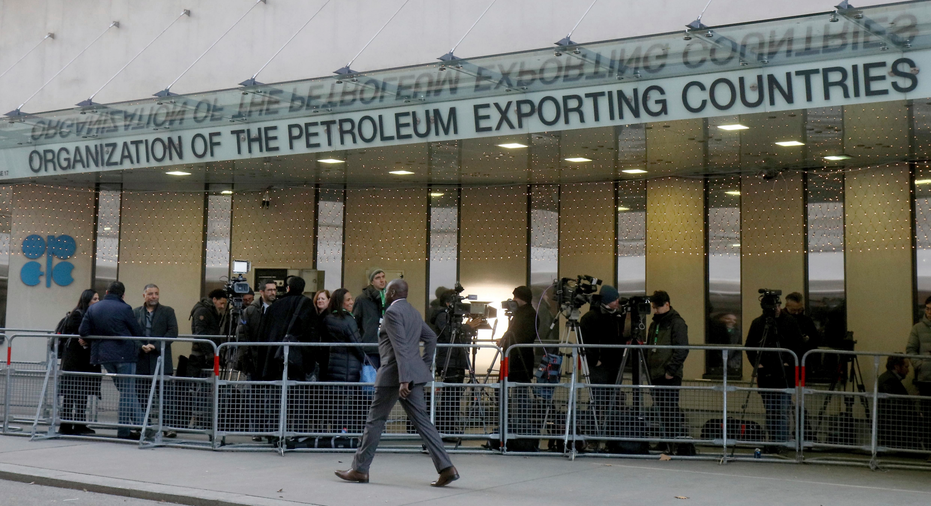The Latest: OPEC output decision delayed until Russia talks
General view of a meeting of oil ministers of the Organization of the Petroleum Exporting Countries, OPEC, at their headquarters in Vienna, Austria, Thursday, Dec. 6, 2018. (AP Photo/Ronald Zak)
VIENNA – The Latest on OPEC's meeting on whether to cut oil production and support energy prices (all times local):
6:40 p.m.
Saudi Arabia's energy minister says OPEC nations have not yet been able to decide upon a possible production cut and is expressing skepticism about when an agreement will be reached.
Leaving a day-long meeting Thursday when an agreement was expected to have been reached, Khalid al-Falih told reporters "we're still deliberating." OPEC countries will on Friday meet with Russia to negotiate its contribution to the overall cuts.
Going in to the day he said Saudi Arabia was eyeing a cut of 1 million barrels per day as "adequate" to respond to recent declines in oil prices, with each country cutting an equal percentage.
Afterward, when asked if the 1 million barrel target was still roughly the same, he said "probably," but added the countries were "still debating distribution, participation."
The countries were set to meet again on Friday, but al-Falih said he was "not confident" an agreement would be reached then.
___
12:45 p.m.
The United Arab Emirates' energy minister is dismissing concerns that U.S. pressure could affect OPEC's decision on whether to cut oil production.
Suhail Mohamed al-Mazrouei, who is OPEC's current president, told reporters ahead of the group's meeting Thursday that "we are not a political organization."
He says: "We will do what the market requires us to do, and that's how we have been working in the past."
OPEC heavyweight Saudi Arabia has indicated it is willing to cut production, despite U.S. President Donald Trump's pressure against a cut. Some have raised concerns that Trump's decision to not sanction Saudi Arabia over the killing of a dissident journalist might sway the kingdom.
Saudi Oil Minister Khalid Al-Falih dismissed that, telling reporters Thursday: "I don't need permission from any foreign governments."
___
12:00 p.m.
Iraq's oil minister says he is confident that officials from major oil-producing countries will reach an agreement that will help stabilize the price of crude.
Thamir Ghadhban said as ministers from the Organization of the Petroleum Exporting Countries gathered Thursday that "the severe slide in the price in the last two months is not in the interest of all the OPEC members, and even non-OPEC members."
He tells reporters the nations are "after a stable market and also a fair price for the producers as well as the consumers."
He would not comment on specifics about a predicted cut to production, but says "I am optimistic there will be an agreement... (that) will stabilize the market, will stop the slide in the price."
___
11:50 a.m.
Saudi Arabia's energy minister says his country sees an oil production cut of 1 million barrels per day as "adequate" to respond to recent declines in oil prices.
Heading in to a meeting of OPEC countries in Vienna on Thursday, Khalid al-Falih told reporters that "all options are on the table" and that Saudi Arabia would be listening to all views.
With crude prices plunging because of oversupply, OPEC is under pressure to cut production, with analysts predicting the nations would decide on a decrease of at least 1 million barrels per day.
The U.S. has been lobbying for production to remain unchanged.
Al-Falih suggested Saudi was leaning toward a cut, saying "I think a million will be adequate personally" with each country cutting an equal percentage.
___
09:00 a.m.
OPEC members are meeting to agree on their response to recent declines in oil prices, with analysts predicting a cut in production of at least 1 million barrels per day.
Crude prices began falling in October and continued to plunge last month because of oversupply and fears weaker global economic growth would dampen energy demand. The price of both benchmark U.S. crude and the standard for internationally traded oil fell 22 percent in November.
Mohammed Hamad al-Rumhy, Oman's oil and gas minister, said Wednesday of the production cut expected at Thursday's meeting that "we haven't discussed the numbers."
U.S. President Donald Trump tweeted Wednesday that "Hopefully OPEC will be keeping oil flows as is, not restricted. The World does not want to see, or need, higher oil prices!"





















